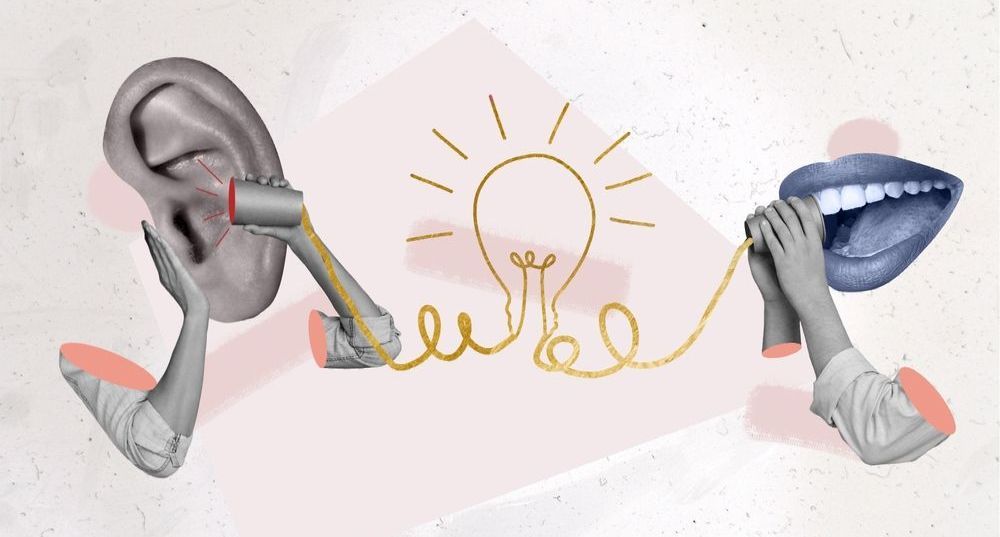Never underestimate the power of taking the time to truly listen to someone else.
What is listening?
Not only does listening enhance your ability to learn and understand messages from another person, done well, empathetic listening can make you a better parent, partner, colleague, CEO, manager, friend, therapist or sibling. It also makes the experience of speaking to you more enjoyable to other people.
Listening demonstrates that you respect others, and is the first step in building trust, rapport and recognising the contributions of others.

What is the purpose of listening to others?
- Listening makes people feel like they matter.
- Arrogance talks. Humility listens. Practice Humility by letting others speak and respond to what they have said, not what you want them to say.
- Listen to help others learn what they really think and find clarity.
- Listen to understand what needs to be acted upon.
- Curiosity. Listen in order to ask questions, not as a means to shower them with your 'wisdom' of what you think they are thinking and feeling. Curiosity brings possibility to a relationship and to a situation or 'problem'. It builds trust that will be carried forward to the next interaction with them.
How is 'Listening' and sound linked to our health as individuals and as a species?
Julian Treasure at his 2011 TedTalk; "5 ways to listen better" encouraged the audience to "listen consciously to live fully for connection, understanding and peace".
Watch the full TedTalk below:
Listening has its enemies
Our findings support existing evidence that managers who listen well are perceived as people leaders, generate more trust, instill higher job satisfaction, and increase their team's creativity. Yet, if listening is so beneficial for employees and for organisations, why is it not more prevalent in the workplace? Why are most employees (managers included) not listened to in the way they want?
Research shows that a few barriers often stand in the way:
- Loss of power - Some managers may feel that if they listen to their employees, they are going to be looked upon as weak. But at the same time, it's been shown that being a good listener means gaining prestige. So it seems manager must make a trade-off between attaining status based on intimidation and getting status based on admiration.
- Listening consumes time and effort - In many instances, managers listen to employees under time pressure or while they're distracted by other thoughts or work. So, listening is an investment decision: everyone holds the power to put in the time to listen in order to see and experience the future benefits for their workplaces and relationships.
- Fear of change - High-quality listening can be risky because it entails entering a speaker's perspective without trying to make judgements. This process could potentially change the listener's attitudes and perceptions. It has been observed several times that when managers are trained to truly listen, they gain crucial insights about their employees - Many are stunned to learn how little they know about the lives of people they've worked with for many years.
Several managers reported in a study that, when they tried listening to employees who they'd confronted about poor attendance, they learned that these employees were struggling with supporting a family member through illness and hardship. This realisation threatened managers' attitudes and views about themselves - an experience called cognitive dissonance that can be difficult to navigate.
Tips for becoming a better listener
Listening resembles a muscle. It requires training, persistence, effort, and most importantly, the intention to become a good listener. It requires clearing your mind from internal and external noise and, if this isn't possible, postponing a conversation for when you can truly listen without being distracted.
Here are some best practices:
- Give 100% of your attention, or do not listen - Put aside your smartphone, iPad, or laptop, and look at the speaker, even if they do not look back at you. In an ordinary conversation, a speaker looks at you occasionally to see that you're still listening.
- Do not interrupt - Resist the urge to interrupt before the speaker indicates they are done for the moment. Go to someone at your work and let them know that you are learning and practicing listening and that today, you will listen for a set amount of minutes (anywhere from 3, 5 or 10 minutes), and delay responding until the predetermined listening time is up. You could even wait until the following day to respond. Oftentimes, managers are amazed at their discoveries with accounts of interactions that would normally take an hour to complete only requiring 6 minutes of listening. In another instance, a manager was able to learn things from a staff member that they had been preventing her from saying for 18 years.
- Do not judge or evaluate - Listen without jumping to conclusions and interpreting what you hear. You may notice your judgemental thoughts but push them aside. If you notice that you lost track of the conversation due to your judgements, apologise to the speaker that your mind was distracted, and ask them to repeat. Do not pretend to listen.
- Do not impose your solutions - The role of the listener is to help the speaker draw up a solution themselves. Therefore, when listening to a fellow colleague or subordinate, refrain from suggesting solutions.
- Ask more (good) questions - Listeners shape conversations by asking questions that benefit the speaker. Good listening requires being thoughtful about what the speaker needs help with most and crafting a question that would lead the speaker to search for an answer. Ask questions to help someone delve deeper into their thoughts and experiences. Before you ask a question, ask yourself, " is this question intended to benefit the speaker or satisfy my own curiosity?" Of course, there is room for both, but a good listener prioritises the needs of the other. One of the best questions you can ask is, "is there anything else?". This often exposes novel information and unexpected opportunities.
- Reflect - When you finish a conversation, reflect on your listening and think about missed opportunities - moments you ignored potential leads or remained silent versus asking questions. When you feel that you were an excellent listener, consider what you gained, and how you can apply this type of listening in more challenging circumstances
Empathetic listening requires that listeners quell the brain's biological need for efficiency, prediction and planning and employ a purely bottom-up process to become truly open to the input of others.
As Ram Charan concluded, "Truly empathetic listening requires courage - the willingness to let go of the old habits and embrace new ones. But once acquired, these listening habits are the very skills that turn would-be leaders into true ones. If we each are indeed creating our own individual perceptions, perhaps empathetic listening is what enables those perceptions to dovetail into collective understanding. Therefore, instead of remaining helpless because of the limitations of his or her own experience and knowledge, instead of having to discover what others have already discovered, instead of exploring the false trails they explored and repeating their errors, he or she can go on from where they left off".
Language and empathetic listening makes effective, sustainable change possible.
Research findings also suggest that attentive and non-judgemental listening seems to make an employee more relaxed, more self-aware of their strengths and weaknesses, and more willing to reflect in a non-defensive manner. This can make employees more likely to cooperate (versus compete) with other colleagues, as they become more interested in sharing their attitudes, not not necessarily in trying to persuade others to adopt them, and more open to considering other points of view.
This is relevant to all employees at all levels. Listening is about listening to others, being listened to and listening to ourselves.
Resources:
Ferry, K (2023) 'The Science of Listening'. Briefings Magazine.
Itzchakov, G. Kluger, A.N. (May 17, 2018) 'The Power of Listening in Helping People Change'. Harvard Business School.
Treasure, J. (2011) '5 Ways to Listen Better'. Ted Global 2011, July.
Darwin Head Office
Level 2, The Avenue
217/12 Salonika Street
Parap NT 0820
(above Karma Cafe)
P: (08) 8941 1752
E:
easadarwin@easa.org.au
Toll Free: 1800 193 123 (NT only)
Alice Springs
Jock Nelson Centre
10/16 Hartley Street,
Alice Springs NT 0870
P: (08) 8953 4225
E: easaalicesprings@easa.org.au
Katherine
Katherine Regional Training Centre
Block F, Room 3
19 Second Street
Katherine NT 0850
P: (08) 8941 1752
E: easadarwin@easa.org.au
Visiting Service
Jabiru
Coolalinga
Tennant Creek
Nhulunbuy
Royal Darwin Hospital


EASA acknowledges and pays respect to the Traditional Owners of the country in which we work and live and recognise their continuing connection to land, waters and community.
We will stand with them to care for and protect their lands.
Contact Us
We will get back to you as soon as possible.
Please try again later.







